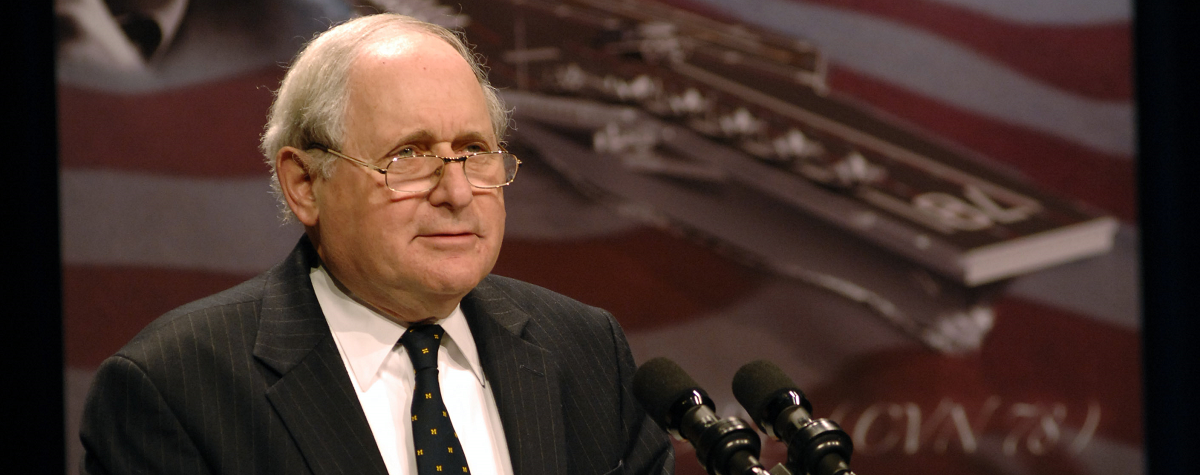Michigan Senator Carl Levin retired last December after 36 years on the Hill, most notably serving as the chairman of the Permanent Subcommittee On Investigations. Communications between the Senator and the IRS - released via a FOIA request by MuckRock’s Todd Feathers - showcase the Senator’s long history of taking to task those who try to get out of paying their taxes.
The Wyly Brothers
In one of the earliest communications we have between Levin and the IRS - dating back to 2006 - he and Sen. Norm Coleman refer the agency to the case of Sam and Charles Wyly. These brothers - once two of the richest Americans - were engaged in a complex offshore tax-fraud scheme to the tune of several billion dollars.
This case is running on to this day and has even outlived one of the brothers, but it seems to have gotten its start in the letter below. Today, the IRS is seeking to recover $3.22 billion in estimated unpaid taxes from the brothers.
In the same letter, the Senators also referred the IRS to a strategy known as POINT. Under this illegal scheme, the Seattle-based Quellos Group fabricated billions of dollars of securities transactions in order to create capital losses. Clients of Quellos could then use these losses in order to offset profits, thereby avoiding U.S. taxes. This was again possible via use of offshore secrecy laws in tax havens like the Cayman Islands and the Isle of Man.
An official Congressional record from a year later reveals that at least a few of the major participants in the POINT scheme ended up settling with the IRS, returning over a billion dollars in unpaid taxes to the American public.
The UBS Agreement
Leaping ahead to 2009, we have communications in which the Senator requested information pertaining to the agency’s voluntary disclosure program. In 2009, the IRS implemented its first program of this type for taxpayers with undeclared foreign bank accounts; by identifying their own accounts and agreeing to pay what they owed, citizens who had previously evaded taxes could avoid even larger penalties.
As you might guess, this program was not initially a wild success. However, many changed their tune after UBS - a major Swiss bank that had been helping wealthy Americans to hide their money abroad - agreed to disclose the names of its customers to the IRS. In a letter to Sen. Levin dated Nov. 19, 2009, IRS Commissioner Shulman wrote that 12,000 of the 14,700 people who came forward under the voluntary disclosure program did so after the Swiss-U.S. agreement was announced.
According to a retrospective look by Bloomberg, the agency’s ongoing voluntary disclosure program has netted the American public $6.5 billion since 2009 from approximately 45,000 participants. While Sen. Levin may not have been explicitly involved in the project, the letters between him and Commissioner Shulman demonstrate a concern that is refreshing coming from a modern Senator.
Catching a Corporation
The bulk of the communications we received came from 2012 and 2013. During this time, Sen. Levin seems to have focused on more complex tax dodges and to have shifted his attention onto multinational corporations.
In January 2012, Sens. Coburn and Levin sent a letter to the IRS requesting information about the declared values of intellectual property transferred to foreign subsidiaries of U.S. corporations and the actual estimated values. This began an extensive look into the practice of exploiting transfer pricing to reduce a company’s tax burden.
Imagine a fictional company that makes $1 million in each country that it operates in. The company operates a subsidiary in each country, so Sub A pays taxes in Country A, Sub B pays taxes in Country B, and so on.
Now imagine that Country A has a tax rate of 35% while Country B has a tax rate of only 5%. It makes sense for the parent company to transfer the profits of Sub A to Sub B if it can. This is accomplished by exploiting transfer pricing. Sub A simply “sells” the intellectual property rights to the products it sells to Sub B - usually for far less than they are worth - and then pays Sub B royalties. These royalties are declared as a business expense, meaning that the taxable profits of Sub A decrease and increase by a corresponding amount in Sub B, reducing the parent company’s overall tax bill. (In practice, things are a little more complicated.)
There are several communications between Sen. Levin and members of the IRS on this issue and the related issue of capital repatriation. The U.S. has a “worldwide” tax system, meaning that even if Sub B were to enjoy its 5% tax rate, it’s American parent company would owe the difference between this rate and the U.S. rate. There are ways of getting around this, but they involve keeping the money overseas - taxes have to be paid on any money that is repatriated.
Several of Levin’s communications have to do with a so-called “staggered short-term loan” program that Hewlett Packard was using to fund its domestic activities with foreign-held cash. By using loans from several foreign subsidiaries, each of which was paid off by the next within 30 days, HP was able to access its foreign capital without incurring a tax burden.
The IRS’s response to Sen. Levin also serves to show how frustrating it can be to deal with a government agency - even as a high-level politician. Several of the Senator’s questions on this issue were answered with some variant of “The potential application of the pledge or guarantee rules, or judicial doctrines, will depend on a consideration of all the facts and circumstances.” In other words, ‘We’d rather not say.’
Image via Wikimedia Commons




